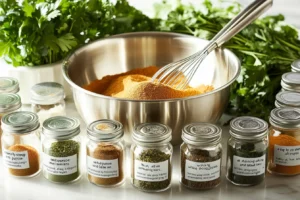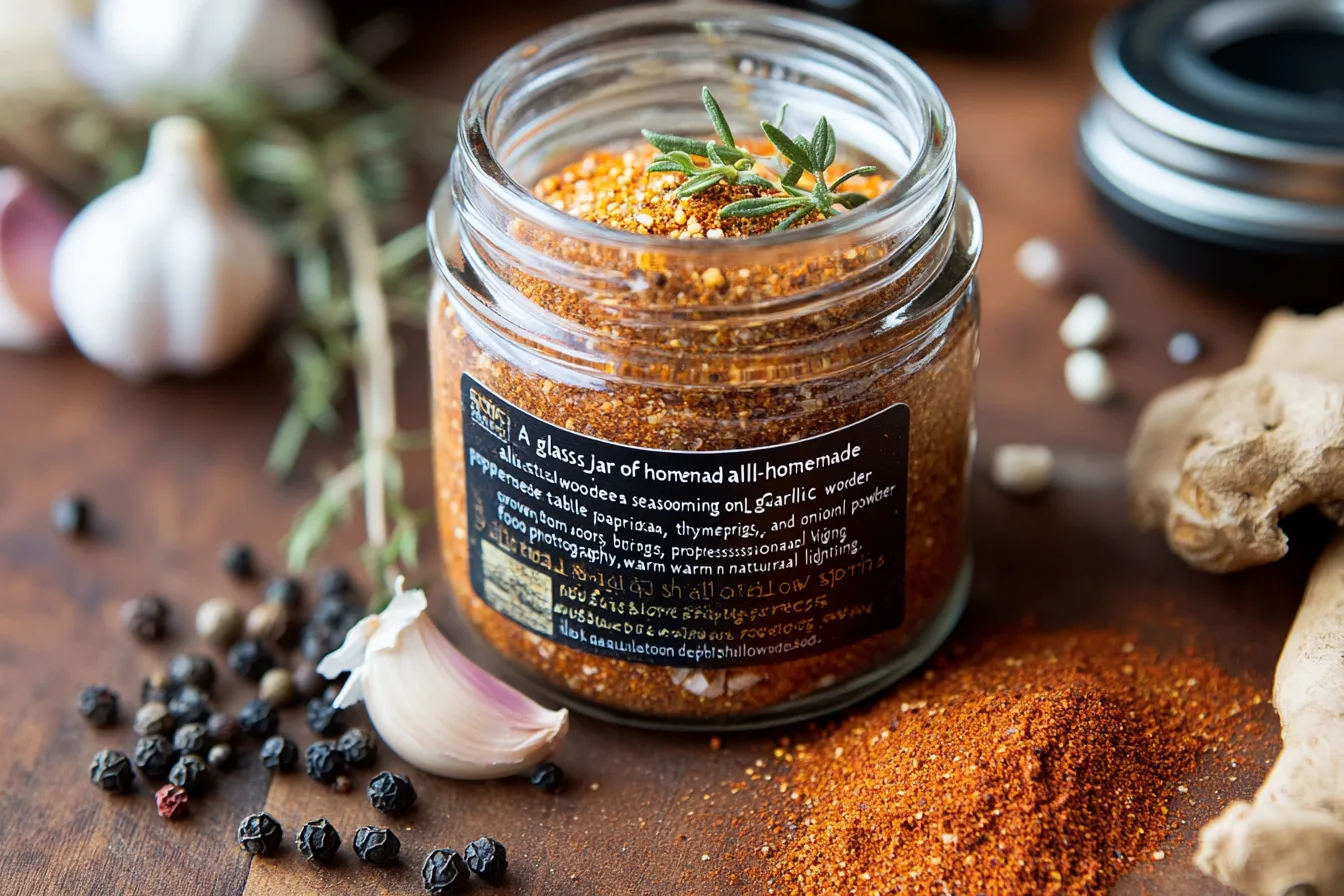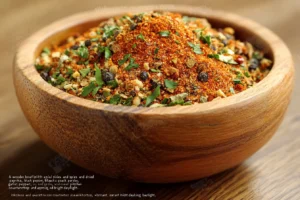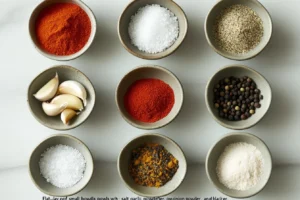How to Make All-Purpose Seasoning at Home

Creating your own all-purpose seasoning at home is simple and allows you to customize the flavors to suit your taste. Here’s a step-by-step guide:
Basic Recipe (5 Ingredients)
- Ingredients:
- 2 tablespoons salt
- 1 tablespoon garlic powder
- 1 tablespoon onion powder
- 1 tablespoon paprika
- 1 teaspoon black pepper
- Instructions:
- Combine all ingredients in a small bowl.
- Mix thoroughly to ensure even distribution.
- Transfer the mixture into an airtight container for storage.
Optional Add-Ons for Custom Flavor Profiles
- Herbs: Add dried thyme, parsley, or oregano for a more herbaceous flavor.
- Spices: Incorporate cayenne pepper for heat, smoked paprika for smokiness, or turmeric for an earthy touch.
- Zest: Dried lemon or orange zest can provide a bright, citrusy note.
Tools and Tips for Mixing and Storage
- Use a whisk or shake ingredients in a jar with a tight-fitting lid for uniform blending.
- Store the seasoning in a clean, dry, airtight container away from heat and light to preserve freshness.
- Label the container with the date to track freshness; the blend is best used within six months.
Benefits of Homemade All-Purpose Seasoning
- Customization: Tailor the blend to your dietary needs (e.g., low-sodium or organic).
- Cost-Effectiveness: Homemade blends are often cheaper than store-bought options.
- Quality Control: Avoid additives and preservatives for a pure, natural mix.
Uses for All-Purpose Seasoning
Applications in Cooking
- Seasoning Proteins: Use it as a dry rub for chicken, beef, pork, or fish. Sprinkle it on before grilling, roasting, or sautéing.
- Flavoring Vegetables: Toss vegetables like broccoli, carrots, or zucchini in olive oil and seasoning before roasting or stir-frying.
- Enhancing Grains: Add a pinch to rice, quinoa, or couscous for added flavor.
Boosting Soups, Stews, and Marinades
- Stir a teaspoon of seasoning into soups or stews to build depth and richness.
- Mix it with olive oil, vinegar, or yogurt to create flavorful marinades for meats or tofu.
Non-Traditional Uses
- Sprinkle on popcorn for a savory snack.
- Dust over fries, roasted nuts, or even scrambled eggs for an extra kick.
Suggested Recipes
- Roasted Potatoes: Toss diced potatoes with olive oil and all-purpose seasoning, then roast until crispy.
- Grilled Chicken: Rub chicken breasts with the seasoning and grill to perfection.
- Vegetable Stir-Fry: Add a dash of seasoning to a medley of stir-fried vegetables for a quick, flavorful meal.
-
Health Benefits of All-Purpose Seasoning
Homemade all-purpose seasoning is a healthier option than many store-bought blends. When you make it yourself, you can control what goes into it. This allows you to match it to your dietary needs and preferences.
A major advantage of homemade seasoning is that it has no additives or preservatives. Store-bought versions often include artificial ingredients like monosodium glutamate (MSG) or anti-caking agents. These can lead to health issues, such as high blood pressure or water retention, especially when they contain too much sodium. Making your own seasoning avoids these concerns and ensures a more natural mix.
You can also lower the sodium content without losing flavor. Instead of regular salt, you can use low-sodium salt or potassium-based substitutes. To keep the seasoning flavorful, add herbs like thyme, parsley, or rosemary. Spices like paprika, cumin, or turmeric can also make up for less salt, giving your blend richness and complexity.
Using all-purpose seasoning encourages healthier cooking. It makes it easier to use fresh, wholesome ingredients in your meals. At the same time, it helps reduce the need for processed foods. By making your own blend, you have a versatile and flavorful tool to enhance your dishes while staying health-conscious.
Popular All-Purpose Seasoning Brands
Some popular brands include Lawry’s and Mrs. Dash. Lawry’s is known for its balance of salt and paprika, giving it a savory taste. Mrs. Dash is a salt-free option filled with herbs and spices, making it a great choice for those watching their sodium intake.
While these brands are convenient, homemade seasoning lets you customize the blend to suit your preferences. It gives you full control over the ingredients, making it the better choice for health-conscious cooks.
Storing and Shelf Life of All-Purpose Seasoning
Proper storage is crucial for preserving the freshness and flavor of all-purpose seasoning. To begin with, the best way to store your blend is in an airtight container, such as a glass jar or a food-grade plastic container with a tight-sealing lid. This way, you can prevent exposure to air, moisture, and contaminants that may degrade the quality of the seasoning.
Furthermore, for optimal longevity, keep the container in a cool, dry, and dark place, such as a pantry or cupboard. It is important to note that you should avoid storing the seasoning near heat sources, such as stoves or ovens, or in direct sunlight. Otherwise, heat and light can cause the spices to lose their potency more quickly.
When stored correctly, homemade all-purpose seasoning can last 6 to 12 months. Nevertheless, its shelf life may vary depending on the freshness of the ingredients used. Spices and herbs naturally lose their flavor and aroma over time. Therefore, starting with fresh, high-quality ingredients will help extend the seasoning’s usability.
Signs That All-Purpose Seasoning Has Gone Stale
Faded Color
If the seasoning looks dull or its colors seem muted, it has likely lost its freshness. Spices should have a vibrant appearance.
Weakened Aroma
Fresh seasoning should have a strong, distinctive smell. If it smells bland or no longer has its usual scent, it may not be effective.
Clumping
Clumps in your seasoning often mean it has been exposed to moisture. This can result from improper storage or contamination.
In Summary
Check your seasoning regularly to ensure it stays fresh and flavorful. Fresh seasoning will keep your meals tasting bold and delicious.
FAQs About All-Purpose Seasoning
What is all-purpose seasoning made of?
All-purpose seasoning is usually a blend of basic spices and herbs. These commonly include salt, garlic powder, onion powder, paprika, and black pepper. For more variety, people often add cayenne pepper, thyme, or parsley to adjust the flavor to their preferences or regional tastes.
How is it different from other seasoning blends?
Unlike other blends, such as taco seasoning or Italian seasoning, which are designed for specific cuisines, all-purpose seasoning is extremely versatile. It pairs well with a wide range of dishes, making it a favorite for everyday use. On the other hand, specialized blends are crafted for more targeted flavor profiles.
Can I use all-purpose seasoning for grilling?
Absolutely! All-purpose seasoning is excellent for grilling. It works as a dry rub for meats, adds flavor to vegetables, and can be mixed with oil to create marinades. Its ability to enhance smoky, grilled flavors makes it a go-to choice for barbecue enthusiasts.
Is all-purpose seasoning gluten-free?
Most homemade all-purpose seasonings are gluten-free, as they rely solely on pure spices and herbs. However, store-bought versions may contain additives or fillers that could include gluten. Always read the label to ensure it is safe for a gluten-free diet.
How can I make a low-sodium version?
To make a low-sodium version, simply replace regular salt with a low-sodium alternative or skip the salt altogether. Enhance the flavor by adding more garlic powder, onion powder, and paprika. Additionally, fresh herbs like rosemary or thyme can deepen the taste without relying on salt.
What are the best substitutes for all-purpose seasoning?
If you’re out of all-purpose seasoning, a quick substitute can be made by mixing equal parts of salt, pepper, garlic powder, and paprika. Other blends, such as Cajun seasoning or seasoned salt, can work in a pinch but may alter the dish’s flavor slightly.
Is Lawry’s all-purpose seasoning?
Lawry’s Seasoned Salt is a popular choice often used as an all-purpose seasoning. However, its flavor is distinct due to the addition of sugar, turmeric, and other unique spices, making it slightly different from a traditional all-purpose blend.
What is in Jamaican all-purpose seasoning?
Jamaican all-purpose seasoning often includes warm spices such as allspice, nutmeg, and black pepper. Garlic, thyme, and scotch bonnet pepper are also common, giving it a bold and aromatic Caribbean twist.
Moreover, experimenting with all-purpose seasoning encourages culinary creativity. Its adaptable nature allows you to explore both traditional and bold new dishes, bringing excitement and inspiration to your meals. For more ideas, you can explore related recipes like the turkey mince recipes for a flavorful twist or learn how to elevate soups with ideas from soup maker recipes. Additionally, check out easy dinner recipes for one for inspiration on quick and delicious meals that pair well with all-purpose seasoning.
Conclusion
All-purpose seasoning is an incredibly versatile and essential ingredient for any kitchen. Its ability to enhance the flavors of meats, vegetables, grains, and even snacks makes it a must-have for everyday cooking. Whether you’re grilling, roasting, or sautéing, this seasoning simplifies the cooking process while delivering rich and satisfying flavors.
Making your own blend at home offers numerous benefits. You can customize it to fit your dietary preferences, such as creating a low-sodium or gluten-free version. It’s also cost-effective and free from artificial additives, providing a healthier and more natural alternative to store-bought options.



